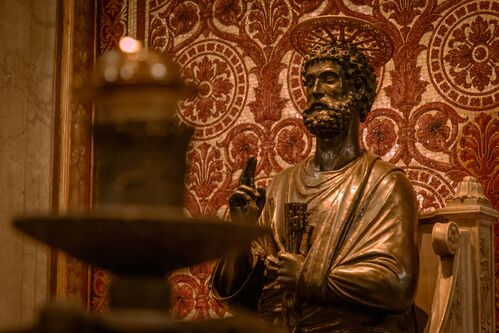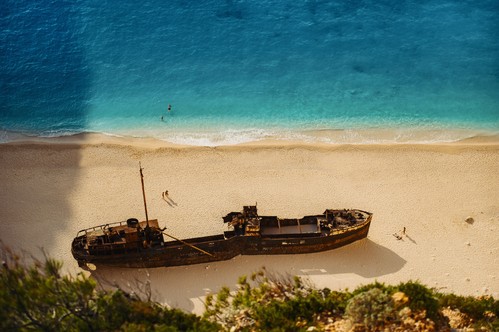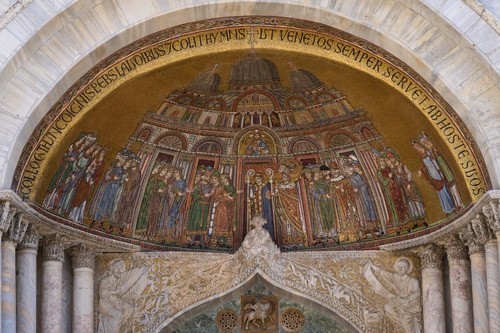December 10th, 2024
by Zach Terry
by Zach Terry
It might surprise you to know that, as an adult, I have renewed my belief in Santa! Not the jolly man in the red suit with a sleigh and reindeer, but the historical figure who inspired the legend: Saint Nicholas, the fourth-century bishop of Myra. While his image has evolved into the modern secular Santa Claus, his origin story—grounded in faith, generosity, and courage—offers powerful lessons for us today.

The Historical Saint Nicholas
Nicholas was born on March 15, 270 AD, in Patara, a village in modern-day Turkey. He came from a wealthy Greek family and eventually became the Bishop of Myra in Lycia. The Bible mentions Patara as a stop on one of Paul’s missionary journeys (Acts 21:1). Myra, the center of Nicholas’s ministry, was also where Paul, as a prisoner, appealed to Caesar (Acts 27:5). This region’s strong Gospel witness may have influenced Nicholas in his faith.
Despite his privileged upbringing, Nicholas’s life was marked by hardship. Orphaned at a young age due to a plague, he embraced Christianity during a visit to Jerusalem. His ministry thrived despite intense persecution under Roman Emperor Diocletian, and he endured imprisonment and beatings for his faith. Nicholas’s story shows us at least three important lessons:
Despite his privileged upbringing, Nicholas’s life was marked by hardship. Orphaned at a young age due to a plague, he embraced Christianity during a visit to Jerusalem. His ministry thrived despite intense persecution under Roman Emperor Diocletian, and he endured imprisonment and beatings for his faith. Nicholas’s story shows us at least three important lessons:

Lesson #1: Suffer Well
Little is known about the early life of Nicholas. We do know that he was born to a very wealthy family and that his parents died due to a plague that swept through the region when he was very young. Nevertheless, Nicholas came to Christ during a trip to Jerusalem as a child.
But this was not an easy time to follow Christ- it was a season of great persecution. Roman Emperor Diocletian, who reigned from 284–305, hated Christians and stuffed Roman jails full of them. Bishop Nicholas spent the first few years of the fourth century in jail and faced routine beatings. It would be over a decade until Constantine would legalize Christianity, freeing Nicholas to preach the Gospel. Like Nicholas, we as believers may be called to suffer for the cause of Christ.
If we do, let us remember:
Suffering sets our hearts on eternity.
Suffering reminds us that this world, as it is, is not and never will be our home.
Paul compares present circumstances with our assured future in Romans 8:18–23 (NASB95):
18 For I consider that the sufferings of this present time are not worthy to be compared with the glory that is to be revealed to us. 19 For the anxious longing of the creation waits eagerly for the revealing of the sons of God. 20 For the creation was subjected to futility, not willingly, but because of Him who subjected it, in hope 21 that the creation itself also will be set free from its slavery to corruption into the freedom of the glory of the children of God. 22 For we know that the whole creation groans and suffers the pains of childbirth together until now. 23 And not only this, but also we ourselves, having the first fruits of the Spirit, even we ourselves groan within ourselves, waiting eagerly for our adoption as sons, the redemption of our body.
This present suffering is the groaning of creation and we groan with it, looking forward to a day where all suffering will cease.
2 Corinthians 4:17 (NASB95)
17 For momentary, light affliction is producing for us an eternal weight of glory far beyond all comparison.
And what did Paul consider momentary, light affliction? He had been:
Imprisoned,
Beaten with 39 lashes 5 times,
Beaten with rods 3 times,
Stoned,
Shipwrecked 3 times,
Suffered many sleepless nights,
Hungry and thirsty, and
Questioned constantly about his qualifications.
He reminds us that these sufferings produce for us an eternal weight of glory far beyond all comparison. Suffering reminds us of the presence of sin…and should cause us to look homeward.
But this was not an easy time to follow Christ- it was a season of great persecution. Roman Emperor Diocletian, who reigned from 284–305, hated Christians and stuffed Roman jails full of them. Bishop Nicholas spent the first few years of the fourth century in jail and faced routine beatings. It would be over a decade until Constantine would legalize Christianity, freeing Nicholas to preach the Gospel. Like Nicholas, we as believers may be called to suffer for the cause of Christ.
If we do, let us remember:
Suffering sets our hearts on eternity.
Suffering reminds us that this world, as it is, is not and never will be our home.
Paul compares present circumstances with our assured future in Romans 8:18–23 (NASB95):
18 For I consider that the sufferings of this present time are not worthy to be compared with the glory that is to be revealed to us. 19 For the anxious longing of the creation waits eagerly for the revealing of the sons of God. 20 For the creation was subjected to futility, not willingly, but because of Him who subjected it, in hope 21 that the creation itself also will be set free from its slavery to corruption into the freedom of the glory of the children of God. 22 For we know that the whole creation groans and suffers the pains of childbirth together until now. 23 And not only this, but also we ourselves, having the first fruits of the Spirit, even we ourselves groan within ourselves, waiting eagerly for our adoption as sons, the redemption of our body.
This present suffering is the groaning of creation and we groan with it, looking forward to a day where all suffering will cease.
2 Corinthians 4:17 (NASB95)
17 For momentary, light affliction is producing for us an eternal weight of glory far beyond all comparison.
And what did Paul consider momentary, light affliction? He had been:
Imprisoned,
Beaten with 39 lashes 5 times,
Beaten with rods 3 times,
Stoned,
Shipwrecked 3 times,
Suffered many sleepless nights,
Hungry and thirsty, and
Questioned constantly about his qualifications.
He reminds us that these sufferings produce for us an eternal weight of glory far beyond all comparison. Suffering reminds us of the presence of sin…and should cause us to look homeward.

Lesson #2: Give Big
It comes as no surprise that Nicholas was an extremely generous man. Nicholas used his whole inheritance to assist the needy, the sick, and the suffering. He dedicated his life to serving God and was made Bishop of Myra. Perhaps his most famous act of kindness was helping three sisters. Because their family was too poor to pay for their wedding dowry, three young Christian women faced a life of prostitution until Nicholas paid their dowry, thereby saving them from a horrible life of sexual slavery. Mysteriously, on three occasions, bags of gold were thrown through open windows in the poor man’s home and landed in stockings left to dry by the fire. It is thought that the money was provided by Nicholas. The daughters now had their dowries, and this led to the custom of children hanging stockings by the fire, eagerly awaiting gifts from Saint Nicholas According to one source, “He was known to frequently give gifts to children, sometimes even hanging socks filled with treats and gifts.”

LESSON #3 Stand for Truth
As the legend goes, Bishop Nicholas was present at the Church’s First Ecumenical Council at Constantine’s summer palace in Nicea in 325. Hundreds of Bishops gathered there to refute the false views of Arius, a presbyter from Alexandria. Arius denied Christ’s deity. At that point in time, the Deity of Christ was the chief issue that had to be settled by the church. Those in favor of affirming the Deity of Christ were led by Athanasius, Bishop of Alexandria. In attendance at the Council of Nicaea was a Bishop from Myra in Lycia named Nicholas, casting his vote affirming his belief that Jesus Christ was God in the Flesh. It is said that there was hardly a man in the room who didn’t have the scars of persecution. Lost eyes, lost limbs, and the like were all around. At one point, while Arius was addressing the council, Nicholas’s rage got the better of him. According to some of his biographers, Nicholas stood up, crossed the floor to Arius, and promptly punched him in the face. For the assault, Nicholas found himself back in jail again. The bishops deliberated his fate. Nicholas was repentant and sought forgiveness. After the Council, Constantine granted clemency and restored Bishop Nicholas to his post.
Here is the Nicean Creed Nicholas stood for:
Here is the Nicean Creed Nicholas stood for:
The Original Nicean Creed of 325 AD (popular version)
We believe in one God, the Father Almighty, Maker of all things visible and invisible. And in one Lord Jesus Christ, the Son of God, begotten of the Father [the only-begotten; that is, of the essence of the Father, God of God], Light of Light, very God of very God, begotten, not made, being of one substance with the Father; By whom all things were made [both in heaven and on earth]; Who for us men, and for our salvation, came down and was incarnate and was made man; He suffered, and the third day he rose again ascended into heaven; From thence he shall come to judge the quick and the dead. And in the Holy Ghost.
We believe in one God, the Father Almighty, Maker of all things visible and invisible. And in one Lord Jesus Christ, the Son of God, begotten of the Father [the only-begotten; that is, of the essence of the Father, God of God], Light of Light, very God of very God, begotten, not made, being of one substance with the Father; By whom all things were made [both in heaven and on earth]; Who for us men, and for our salvation, came down and was incarnate and was made man; He suffered, and the third day he rose again ascended into heaven; From thence he shall come to judge the quick and the dead. And in the Holy Ghost.
Saint Nicholas, an Honorable Example for Our Children
As time has gone on, many other traditions have been combined to create today's "Santa Claus". As you celebrate Christmas with your family, consider using these lessons from the Original Kris Kringle, Saint Nicholas of Myra. He truly was an example worth following.
The Maximum Life Blog
My name is Zach Terry. The thoughts and opinions expressed in this blog are my own, with occasional interjections from my bride of nearly 25 years, Julie. This format of publication is meant to allow for engagement and interaction. Feel free to comment. But please, be nice.
Recent
Dealing with a Narcissist
January 21st, 2026
The Importance of Children's Theology Books
January 21st, 2026
Maids and Mandrakes: Dysfunction, Departure, and Divine Grace in Genesis 30
January 14th, 2026
Converts and Conflict
January 8th, 2026
Code Red | From the Army to Audiobooks — Faith, Literature, and the Making of a Voice Actor
January 8th, 2026
Archive
2026
January
Cleansing the PalateThe Library of MankindConverts and ConflictCode Red | From the Army to Audiobooks — Faith, Literature, and the Making of a Voice ActorLoved Like RachelSuch a Strange Way to Save the WorldMaids and Mandrakes: Dysfunction, Departure, and Divine Grace in Genesis 30Dealing with a NarcissistThe Importance of Children's Theology Books
2025
February
March
July
August
September
October
Why We Should Bless IsraelGovernment Shutdowns and God’s Blueprint for Smaller GovernmentCompassion and ConsequencesSodom, Netflix, and the Two Paths Before UsRevival Isn’t a Rumor — It’s HappeningIt’s Time to Stop Playing It SafeA New Door OpensPreach the Word. Show Your Hand.When “Love Your Neighbor” Becomes a WeaponA New Day DawningPaving the Way of Anti-ChristThe Church and the Honky-TonkMy Personal Position on Israel
November
2024
April
May
August
November
No Comments